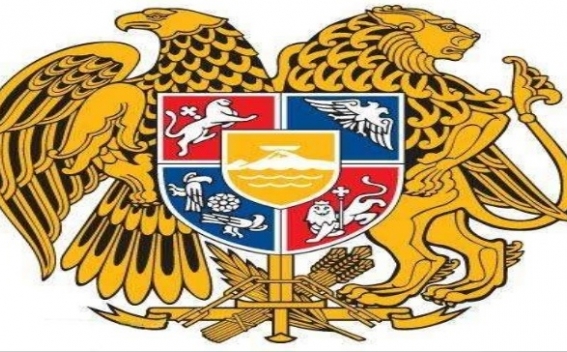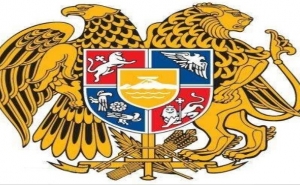Armenia: Young People Discuss South Caucasian Conflicts and Struggle Against IS

The similarities and differences among the conflicts in the South Caucasus, the activity of the Islamic State and fight against it were discussed during the training on November 27 in Yerevan.
The training was initiated by NGO "European Integration" in the framework of the project "The Voice of Youth 4. New Season" supported by the Ministry of Sport and Youth Affairs of the RA. Board member of NGO "Europeaan Integration", PHD of Public Administration Academy of the RA Anna Karapetyan and expert of Public Relations and Information Center State Non-Commercial Organization Liana Hovhannisyan presented their reports during the meeting with young politicians, economists, historians, journalist and students from different universities.
Refereeing to the conflicts in the South Caucasus, their common and different features, expert Anna Karapetyan focused on Karabakh, Ankhazian and South Ossetian conflicts. Both the developments and transformation as well as the progress and the peculiarities of the negotiation processes of the conflicts were touched upon.
Among the peculiarities of the conflicts the issues such as self-determination of the nations and the necessary steps for its realization, some components of conflict resolution, return of refugees, the necessity of bringing out the military forces, deployment of international peacekeepers and so on were discussed. The peculiarities of negotiation formats, particularly direct involvement of NKR in the negotiations, the effectiveness of each of the negotiation formats and the logic were identified. A reference was also made to the choice of mediators and the effectiveness of their work. The participants of the training raised the issue of the effectiveness of the co-chairs’ work and touched upon the risks involved in discussing the issues connected with the Karabakh conflict on other platforms and the way to prevent this negative impact.
A reference was also made to the fact that in contrast to NKR, South Ossetia and Abkhazia, taking advantage of their recognition by the Russian Federation, signed an official agreement with the RF asking to guarantee their security, which automatically legitimized the existence of Russian forces and military equipments on their borders.
In the context of the peculiarities among the conflicts, the Georgian politics of cultural, economic integration towards South Ossetia and Abkhazia was separately discussed. The direct dialogue between Russia and Georgia (on the level of a Deputy Minister and Prime Minister Special Envoy) was also discussed as an important step for trust-building and for recovering economic relations.
The participants were offered to suggest possible mechanisms of trust building in the context of Karabakh conflict which can contribute to the healthy dialogue among the sides and boost the negotiation processes. The participants suggested the negotiation among the sides on different levels such as the one among military commanders and Diaspora representatives. As a trust-building measures several suggestions were made - to quite the Azerbaijani "black list" policy, to make steps for reestablish economic relations, to send observers to each other elections, to conduct text books monitoring , to sign a new non-use of force agreement, etc.
Separately a reference was made to the development around the fight against terrorism in the Middle East. The participants were presented the history of the formation of Islamic State terrorist group. In this context expert Liana Hovhannisyan touched upon those core historical events (war in Afghanistan, the invasion of the US troops to Iraq, the overthrow of Saddam Hussein, etc.) that prepared a fertile ground for the emergence of extremist forces in the region.
During the training a detailed review was made to the motives that make people join terrorist groups, among them the regime change, the economic hardships because of ongoing military operations in the region, the marginal status of the former regime representatives (the former official who do not have appropriate platform to express themselves in the new situation, usually find it among the terrorist groups) and so on.
The participants engaged in an active debate trying to understand in whose interests the emergence of Islamic State in the region from the main political players (US, RF, Sunni and Shia axis in the region) was. In this context a reference was also made to the possible main sources from where the Islamic State is financed (states, donors, Gulf states, the West, profit from the money industry etc).
The possible challenges for the South Caucasus coming from the activity of Islamic State were also discussed. Among those challenges the number of people joining Islamic State from neighboring countries (Georgia, Azerbaijan), the rise of extremist moods in the context of the regional conflicts, etc. were also identified.
The core discussion, following the report was on the recent developments in the region, particularly clash of Russian-Turkish interests in the region and the destroyed Russian helicopter. The participants made assumptions on the real motives of Turkey in destroying Russian helicopter, possible scenarios of the development of events, and the challenges for Armenia as a strategic partner of RF coming from those scenarios.
At the end of the discussion the participants were given an opportunity to present their viewpoints on the effectiveness of the international fight against terrorism and suggest their own solutions to the problem. The participants also presented their stance on Armenia’s present policy towards fight against terrorism. The question raised was as follows: shouldn’t Armenia present its own initiative, the aim of which will be to support its strategic ally Russian Federation, its friend Iran and the Western colleagues involved in the fight against terrorism?
As for the effectiveness of the fight against terrorism and possible actions in this context, according to the majority of the participants the fight against terrorism cannot be effective unless Russia and the West combine their efforts to form a single coalition in the fight against terrorism. In this context the participants had different opinions on Armenia’s possible role in it. Among the suggestions were recognition of the Islamic State as a terrorist organization by the RA Parliament, initiating a resolution in the PACE which will condemn terrorism, RA’s involvement in different humanitarian missions, humanitarian assistance to the countries suffered by terrorism, etc.
Other materials on this subject
- Russian forces have clearly failed in their duties: senators press Biden Administration to break Azerbaijan’s blockade The United States cannot stand aside while the Aliyev regime callously threatens the lives of Nagorno-Karabakh’s citizens, and must hold Azerbaijan to account for blocking a civilian population’s access...
- US calls for the full restoration of free movement through the Lachin Corridor "We remain concerned about impeded access to the Lachin Corridor and the humanitarian implications of this situation. This sets back the peace process and undermines international confidence. We call for...
- Azerbaijani forces violate the ceasefire in Artsakh The ceasefire violation was reported to the command of the Russian peacekeeping troops.
- Azerbaijani units violate ceasefire in several directions, Artsakh’s Defense Ministry says The Armenian side has no losses. The incidents of ceasefire violations were reported to the command of the Russian peacekeeping troops.
- Russian Diplomat Reassures Armenians Over Corridor In Karabakh "The parties are in direct contact, and I assure you that the peacekeepers will not move a single centimeter until there is a new corridor," Seleznyov said.
-
 17:08
17:08The regular session of the Anti-corruption Policy Council takes place in Jermuk
-
 15:05
15:05The Prime Minister sends congratulatory messages to the supreme leader of Iran and the President of Iran
-
 11:11
11:11Armenia sends earthquake aid to Turkey
-
 10:43
10:43Commemoration of the Pontiff St. Sahak Partev
-
 09:16
09:16Some roads are closed and difficult to pass in Armenia
-
 19:55
19:55Phone conversation of the Foreign Minister of Armenia with the U.S. Assistant Secretary of State for European and Eurasian Affairs
-
 18:30
18:30Prime Minister Pashinyan and President Khachaturyan meet
-
 18:20
18:20Ararat Mirzoyan with Co-Chairman of the OSCE Minsk Group of France Brice Roquefeuil
-
 17:01
17:01Humans could land on Mars within 10 years, Musk predicts
-
 16:45
16:45France, US urge 'immediate' end to Nagorno Karabakh blockade
-
 16:01
16:01Blockaded Nagorno Karabakh launches fundraiser to support quake-hit Syria
-
 15:59
15:59Earthquake death toll in Turkey rises to 18,342
-
 15:43
15:43Ararat Mirzoyan Held a Telephone Conversation with Sergey Lavrov
-
 15:06
15:06French president rules out fighter jet supplies to Ukraine in near future
-
 14:47
14:475 Day Weather Forecast in Armenia
-
 14:44
14:44President Vahagn Khachaturyan wrote a note in the book of condolences opened in the Embassy of Syria in Armenia
-
 14:20
14:20Azerbaijan’s provocations impede establishment of peace and stability – Armenian FM tells Russian Co-Chair of OSCE MG
-
 12:57
12:57France representation to OSCE: Paris calls on Azerbaijan to restore freedom of movement through Lachin corridor
-
 11:40
11:40Command of Kosovo forces highly appreciated preparation of Armenian peacekeepers
-
 10:16
10:16The United States withdrew from sanctions against Syria for six months the provision of assistance after the earthquake
day
week
month
Humidity: 45%
Wind: 3.6 km/h


